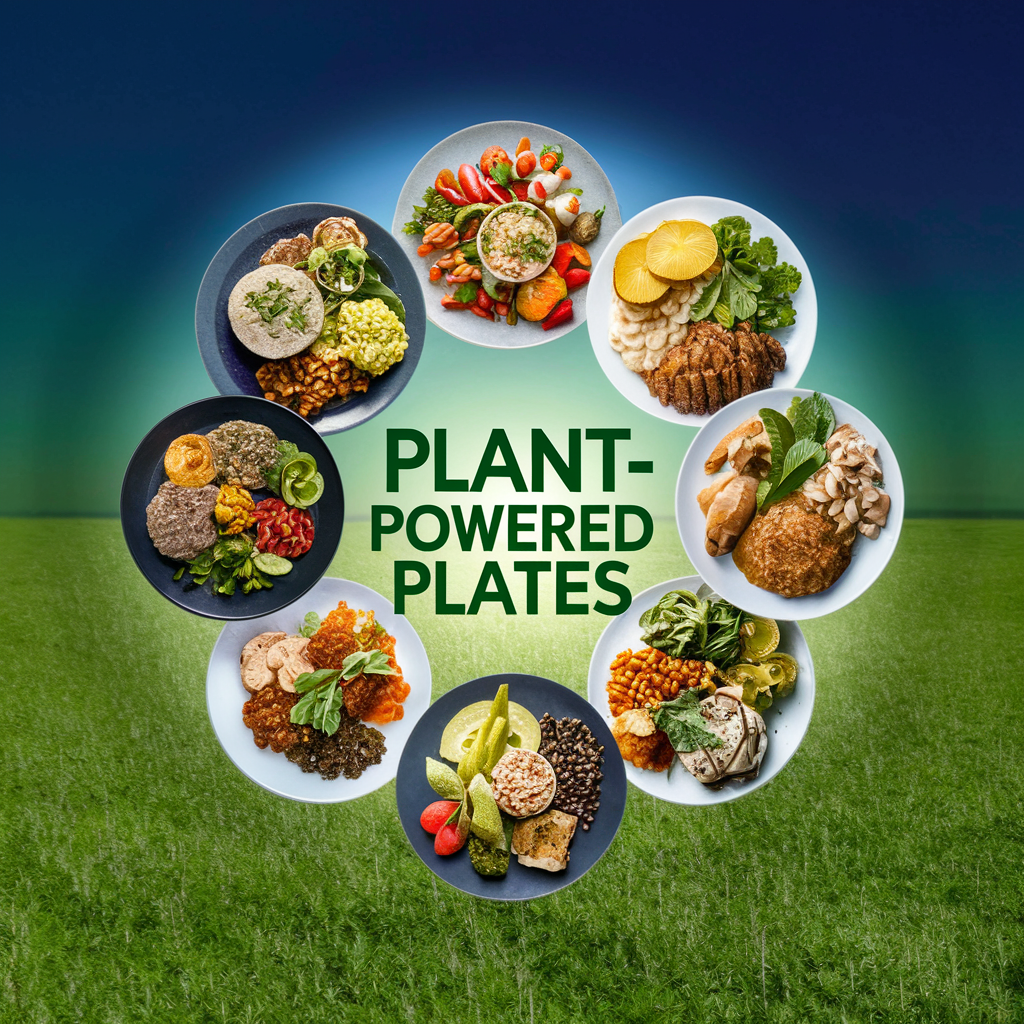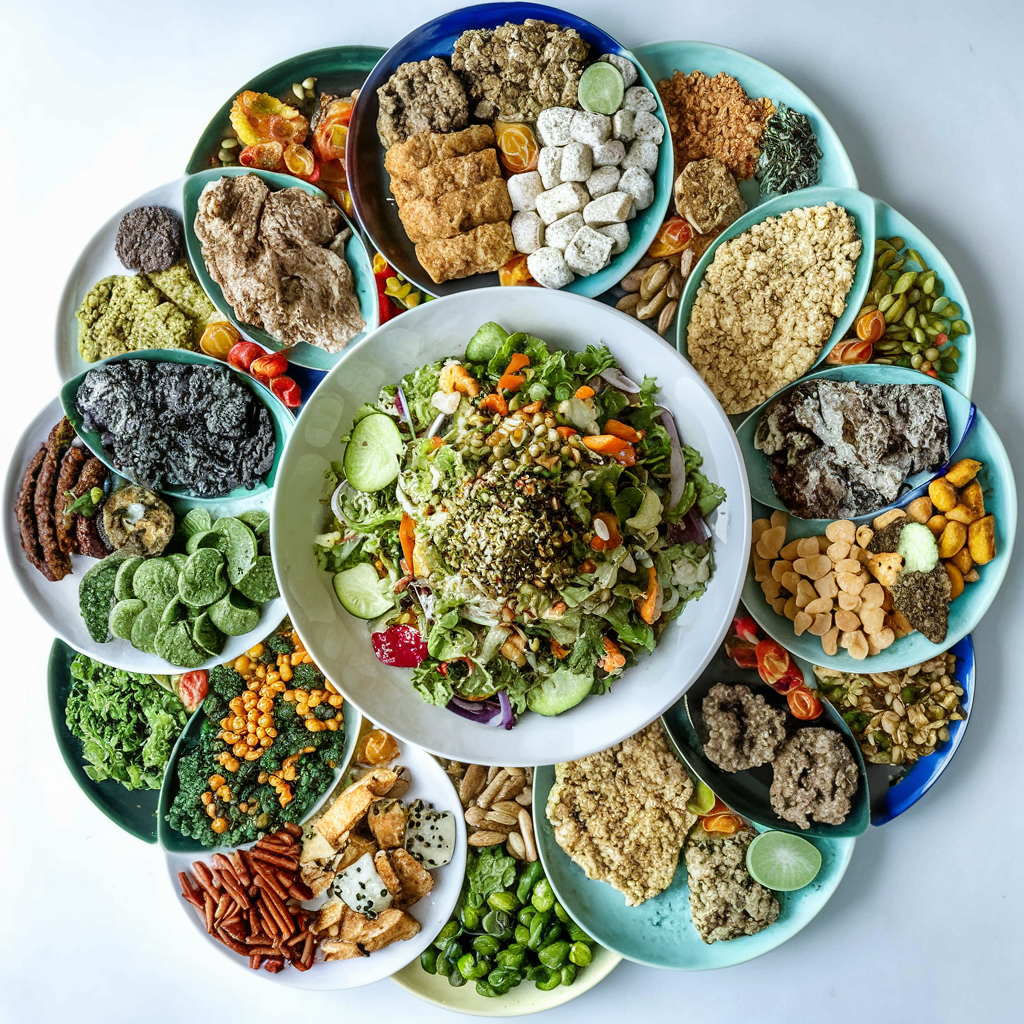
The landscape of nutritional picks is moving, with plant-based food diet taking center stage. The collective emergence of health concerns, environmental responsibility, and ethical animal concerns trigger the considerable protein debate concerning superior protein sources for the ones that are inclined to plant-based diets.
Therefore, the strategy of the protein dispute solution by choosing some vegetable recipes requires a balanced approach of nutrition knowledge, environmental consciousness, and conversation. In this post, I will discuss proven approaches that will help you cope with these challenges, and provide you with a gateway into the rich and nutritional world of plant-based food diet.
WHY THE PLANT-BASED FOOD DIET?
Several factors contribute to the growing popularity of the plant-based food diet:
Potential health beneits
The fact that the researches indicate that the plant-based food diet ensures benefits such as the low risk of heart disease, type 2 diabetes, and some cancers is of note.
Environmental Impact
Animal agriculture produces a great deal of greenhouse gas emissions among others and has a big impact on the depletion of resources. The environmental impact of plant-based food diets is often much lower as compared to diets that are not aligned with the plant-based nature.
Animal welfare concerns:
Animal rights of those who endure cruelty on factory farms due to ethical considerations lead many people to a plant-based lifestyle.
The Protein Puzzle:
Among the most frequently raised issues of plant-based dietary regimens is whether these can satisfy the protein needs. While it’s true that animal sources like meat and dairy are considered “complete proteins,” containing all nine essential amino acids, a well-planned plant-based food diet can provide sufficient protein through various strategies.
Diversity is key:
Going for different kinds of plant-protein sources like beans and their seeds, lentils, soy…, nuts, and seeds helps to make sure that you are getting all the 9 amino acids that are essential to humans.
Complementary proteins:
Popular blends of plant proteins allow one to easily get “a complete protein” profile by combining different sources in a single meal. And just by illustrating an example like the rice and beans combination, we get all nine of the essential types of amino acids.
Supplementation:
In other particular instances, for example, individuals can opt for some supplements manufactured from plants like pea protein or brown rice which is meant as complete protein if the person has high amino acid requirements due to athletic activities or some health conditions.
Finding the balance
The ‘which protein do we need’ dilemma is yet to be resolved, the science keeps on developing with research backing it. Note that everyone’s needs are unique, and dietitians or healthcare professionals are worthwhile to work with to develop a proper plant-based food diet that fits you in terms of your desires for adequate supplies of protein and total health.
Remember
-
- Consult a healthcare professional for personalized guidance.
-
- A balanced plant-based food diet can provide sufficient protein.
-
- Variety, protein combining, and supplementation are strategies to ensure adequate protein intake.

Protein Debate:
ADDRESSING COMMON CONCERNS ABOUT PLANT-BASED PROTEIN.
Typically, what people talk about most when it comes to eating plants is whether there is enough protein in a plant-based food diet, but in this article, we will also consider concerns that come up besides the protein question.
1.Nutrient Deficiencies.
Protein is the biggest element nutrient, and people may worry about the lack of some other essential parts: iron, calcium, and vitamin B12. They all can be suggested while plant-based food diets are your primary food diet. However, the provision of such means would be a great concern and can be adequately addressed.
Dietary choices:
Chewing spinach and other leafy green vegetables, fortified plant milk, and nutritional yeast are great options to be sure that one gets enough of these nutrients.
Supplementation:
In such circumstances, trying the advice from a healthcare specialist on the issue of vitamin B12 supplements may be a wise move.
2.Satiety and Calorie Control:
For some others, eating a plant-based food diet is about not eating again. However, incorporating.
Fiber-rich foods:
These foods consisting of beans, lentils, whole grains, and vegetables are way more filling including them in our diets is a great way to keep our calorie intake under control.
Healthy fats:
To boost the effect of satiety, take in also healthy fats such as nuts, seeds, and especially avocado.
3.Social and Familial Pressures:
Switching to a plant-based food diet can sometimes be a challenge especially as we navigate the social and familial pressure, the egging, or the pushing to eat meat, particularly during group meals or parties. Here are some tips:
Communicate openly:
Write your reasons for choosing a plant-based food diet because you are also interested in understanding and accommodation.
Be prepared:
Voluntarily provide your plant-based dish while eating or ask the restaurants to serve vegan foods when you select.
Focus on the positive:
Show your experience and focus on the appeal you’ve got mounting a plant.
Remember:
-
- A plant-based food diet can quite satisfy and provide all needed quantity of nutrients.
-
- Get advice from a healthcare specialist on top of the general recommendations to address your unique situation or to help you create an individualized plan.
-
- Let’s take a balanced view of it and fully mobilize the transformation of the type of lifestyle that is not only healthy but also sustainable.
By addressing these concerns which very often occur and offering practical solutions, you are providing a means for individuals to make small changes in their lifestyle which translate into bigger outcomes in their quest for a healthier life.
PLANT-BASED PROTEIN POWERHOUSE RECIPES: FUELING YOUR JOURNEY.
The plant-based journey does not involve compromising on your favorite foods and less tasty foods. These are illustrations of the baking art of the various sources of plant-based protein foods.
1.Lentil Shepherd’s Pie:
It is a meatless and hearty dish that uses lentils rather than ground meat, providing a nutritious protein-packed, and tasty alternative for everyday cooking.
2.Rainbow Veggie Buddha Bowl:
Customize the bowl with assorted roasted veggies, cooked quinoa or brown rice for complex carbs, and tahini dressing for a dressing. So, this will give a boost to its nutritional value and also look appetizing.
3.Spicy Black Bean Burgers:
Such bean burgers, made from home using black beans as their base, with protein and fiber – are a great option for your choice of spices and toppings, boosting you with the extra energy for a productive day.
4.Tofu Scramble:
One of the most readily available and protein-rich breakfasts is made of crumbled tofu, turmeric, nutritional yeast, and your best veg option.
5.Peanut Butter and Chia Seed Smoothie:
Combine with flat peanut butter, milk, and chia seeds to have a rich, satisfying, and healthy smoothie at home, as a quick breakfast to go.
Remember:
These words will not cover all steps, though they are just a few, and the world is your imagination. Try out websites, cook, and food blogs that exclusively focus on plant recipes for you to find a limitless culinary scheme and the deliciousness that comes with it at the same time!
Additional Tips:
-
- Make planning and preparing your meals ahead so that you have excellent protein sources at hand whenever you need them.
-
- Try to include different cooking methods which are – baking, roasting, and stir-frying – to make healthy variety in your meals.
-
- Don’t be afraid to create and expand, use different techniques and methods. Comprehend different vegetarian substitutes and test cooking with various flavors and ingredients to identify your personal favorite.
Through following these instructions and adventurous self-experience, you can get a unique pallet and also have an enjoyable memorable experience.
THE future OF PLANT-BASED PROTEIN:
As the plant-based movement continues to gain momentum, expect to see exciting advancements in the realm of protein sources.
1.Plant-Based Meat Alternatives:
The development of plant-based meat alternatives continues to make strides. These products are increasingly replicating the taste and texture of meat, making them more accessible and appealing to a wider audience.
2.Novel Protein Sources:
Research into alternative protein sources like insects, algae, and mycoprotein (fungus-based protein) is ongoing, offering potential solutions for meeting future protein demands in a sustainable manner.
3.Technological Advancements:
Technological advancements like fermentation and precision fermentation may play a significant role in developing even more efficient and sustainable methods for producing plant-based protein.
4.Focus on Sustainability:
As the environmental impact of food production becomes increasingly recognized, the focus will likely shift towards ensuring sustainable practices throughout the plant-based protein supply chain
Additionally, by staying informed about these developments, you can remain engaged in the evolving landscape of plant-based protein and make informed choices that align with your health and sustainability goals.
ADDRESSING POTENTIAL CRITICISMS AND EMBRACING A POSITIVE APPROACH.
While the potential benefits of a plant-based food diet are widely discussed, it’s important to acknowledge and address some potential criticisms often raised:
1.Cost Concerns:
Some individuals might express concerns about the perceived higher cost of certain plant-based protein sources compared to traditional meat options. However, focusing on.
Seasonal and local produce:
When available, opting for seasonal and locally sourced fruits and vegetables can be cost-effective.
Staple grains and legumes:
Staples like beans, lentils, and whole grains are generally affordable and offer significant protein content.
Planning and budgeting:
Meal planning and mindful grocery shopping can help keep costs under control while ensuring a balanced and protein-rich diet.
2.Social and Cultural Challenges:
Integrating a plant-based lifestyle into established social and cultural norms surrounding meals and eating traditions can be challenging. However, focusing on.
Open communication:
Communicating your dietary choices and preferences with respect and understanding can foster acceptance and accommodation within social circles.
Positive influence:
Sharing your experiences and highlighting the health and environmental benefits of the plant-based food diet choices can inspire others to explore this approach.
Finding common ground:
While respecting cultural traditions, seeking common ground and exploring plant-based versions of familiar dishes can offer a bridge for shared meals and experiences.
3.Individual Needs and Preferences:
It’s crucial to remember that one size does not fit all when it comes to dietary approaches. Some individuals may thrive on a plant-based food diet, while others might find success incorporating other dietary patterns to meet their specific needs and preferences. Also, consulting a registered dietitian or qualified healthcare professional can be invaluable in creating a personalized and sustainable dietary plan.
Embracing a Positive Approach:
-
- Potential health advantages
-
- Reduced environmental impact
-
- Alignment with ethical concerns
-
- Delicious and diverse culinary options
Individuals can be motivated to explore, experiment, and discover their own journey towards a balanced and protein-rich plant-based lifestyle.
Moreover, by addressing potential criticisms and fostering a positive and well-rounded perspective, you can contribute to a more informed and constructive conversation surrounding plant-based protein and its role in a sustainable and healthy future
CONCLUSIONS:
The increasing popularity of the plant-based food diets has ignited a dynamic conversation surrounding optimal protein sources. While navigating the protein debate, it’s crucial to remember that a well-planned plant-based food diet can be a nutritious and fulfilling way of life.
However, by incorporating diverse protein sources, utilizing various strategies to ensure adequate intake, and exploring delicious recipes, individuals can embark on a satisfying and sustainable plant-based journey. As research and innovation continue to evolve, the future of plant-based protein holds exciting possibilities for both individual and global well-being.
